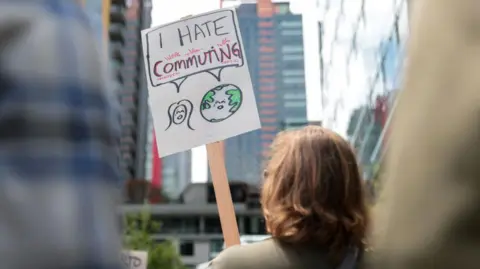Amazon asks workers to return to the office five days a week
 Getty Images
Getty ImagesAmazon is ordering workers back to the office five days a week as it ends its hybrid work policy.
The change will take effect in January, Amazon Chief Executive Andy Jassy said in a statement. Memo to staff.
“We've decided that we're going to go back to the way we were in the office before Covid started,” he said, adding that it would help staff “innovate, collaborate and be better set up to connect” enough for each other.
Mr Jassy has long been a skeptic of remote work, but Amazon workers were previously allowed to work from home two days a week.
Amazon's push to get corporate workers back into the office has sparked tensions at the firm, which employs more than 1.5 million people worldwide in full-time and part-time roles.
Workers at its Seattle headquarters staged a protest last year as the company tightened full remote work allowances during the pandemic.
Amazon subsequently fired the organizer of the protest, prompting claims of unfair retaliation, a dispute that was taken up with labor officials.
In his message on Monday, Mr. Jacey said he was concerned that Amazon — which has long prided itself on maintaining the intensity of a start-up while becoming a tech giant — has seen its corporate culture diluted by inflexible work and too much bureaucracy. level
Mr. Jacey, who replaced founder Jeff Bezos as chief executive in 2021, said he had created a “bureaucratic mailbox” for workers to complain about unnecessary rules and was asking the company to restructure managers so managers could oversee more people.
Amazon said the changes could result in job cuts
In addition to returning to the office five days a week, Amazon said it will be hot-desking in the US.
The agency said workers can still work from home in unusual circumstances, such as a sick child or a home emergency, as was the case before the pandemic.
But until they are released, Mr Jassy said: “Our expectation is that people will stay in office out of exhaustion”.
 Getty Images
Getty ImagesAmazon's position contrasts with the UK government's approach Committed to making flexible working the default from day one A new employment rights bill is due to be published next month
Jonathan Reynolds told the Times newspaper The government wants to end the “culture of complacency” and says there are “real economic benefits” for people working from home.
He said a balance had to be struck, but flexible working arrangements could help businesses recruit from a wider pool of people.
Remote work peaked during the pandemic. Many companies began furloughing workers in 2022, but the return was incomplete.
This summer, about 12% of full-time employees in the U.S. were fully remote, and another 27% reported having hybrid work policies, according to a monthly survey by economists José María Barreiro, Nicholas Bloom and Steven J. Davis.
Bank bosses such as JP Morgan's Jamie Dimon are among the most high-profile figures critical of remote work and perhaps demanding a full-time office presence.
But the sentiment has spread to other industries, with UPS and Dell sending full-time workers back to the office this year.
In his memo, Mr. Jacy said Amazon's experience moving to a hybrid policy “reinforced our belief in the benefits” of working in person.
But Professor Bloom, a professor at Stanford, said he did not think the announcements were a sign of a sweeping change in work ethics, noting that his data showed that time spent in the office had remained fairly stable for more than a year.
“For every high profile company canceling work from home, others seem to be expanding it – they just don't get picked up in the media,” he said.


